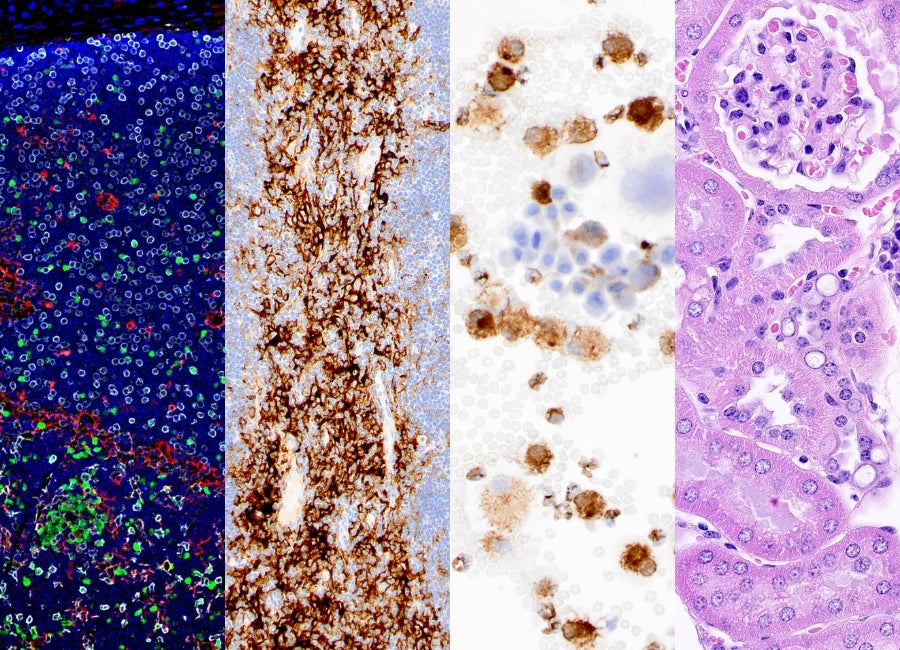
Comparative Pathology Core
What We Do
The Penn Vet Comparative Pathology Core (CPC) offers expertise in veterinary pathology and advanced services in histology, molecular staining, and digital pathology. Staffed by board-certified veterinary pathologists, the CPC provides expert pathological characterization and validation of animal models used in biomedical research and contributes to the evaluation of efficacy and safety during preclinical testing of new therapeutic interventions. In addition, by providing a comprehensive analysis of tissue samples, the CPC supports the identification of therapeutic targets and relevant biomarkers in translational research studies and clinical trials, helping bridge the gap between preclinical discoveries and clinical applications.
Access to Our Services
If you are a University of Pennsylvania research investigator interested in utilizing our services, you can register to use the Comparative Pathology Core Service by using your PennKey.
- To access our services, all accounts must be set up in CAMS. If you have any questions, please contact your business administrator.
- Please refer to the documentation that can be found at www.med.upenn.edu/apps/cams.
Request Manager
Do you need to update an existing request or create a new one, please utilize the pages below.
Services
The core offers many services to help aid in your research.
Importance of Clinical Trials
Clinical trials are a crucial step in the often cyclical “benchtop to bedside” process of translating clinical questions into laboratory research and then into patient care.
Publications
The IAP antagonist birinapant enhances chimeric antigen receptor T cell therapy for glioblastoma by overcoming antigen heterogeneity. Song EZ, Wang X, Philipson BI, Zhang Q, Thokala R, Zhang L, Assenmacher CA, Binder ZA, Ming GL, O’Rourke DM, Song H, Milone MC. Molecular Therapy: Oncolytics. 2022 Nov 15;27:288-304. doi: 10.1016/j.omto.2022.11.004.
Postmortem Study on the Effects of Routine Handling and Manipulation of Laboratory Mice. Assenmacher CA, Lanza M, Tarrant JC, Gardiner KL, Blankemeyer E, Radaelli E. Animals (Basel). 2022 Nov 22;12(23):3234. doi: 10.3390/ani12233234.
Chimeric antigen receptor T cells as adjuvant therapy for unresectable adenocarcinoma. Uslu U, Da T, Assenmacher CA, Scholler J, Young RM, Tchou J, June CH. Science Advances. 2023 Jan 13;9(2):eade2526. doi: 10.1126/sciadv.ade2526.
Tumor-Suppressive and Immune-Stimulating Roles of Cholesterol 25-hydroxylase in Pancreatic Cancer Cells. McBrearty N, Cho C, Chen J, Zahedi F, Peck AR, Radaelli E, Assenmacher CA, Pavlak C, Devine A, Yu P, Lu Z, Zhang H, Li J, Pitarresi JR, Astsaturov I, Cukierman E, Rustgi AK, Stanger BZ, Rui H, Fuchs SY. Molecular Cancer Research. 2023 Mar;21(3):228-239.
Inflammatory monocytes promote granuloma control of Yersinia infection. Sorobetea D, Matsuda R, Peterson ST, Grayczyk JP, Rao I, Krespan E, Lanza M, Assenmacher CA, Mack M, Beiting DP, Radaelli E, Brodsky IE. Nature Microbiology. 2023 Apr;8(4):666-678.
Spontaneous early-onset neurodegeneration in the brainstem and spinal cord of NSG, NOG, and NXG mice. Finesso G, Willis E, Tarrant JC, Lanza M, Sprengers J, Verrelle J, Banerjee E, Hermans E, Assenmacher CA, Radaelli E. Veterinary Pathology. 2023 May;60(3):374-383.
Advanced precision modeling reveals divergent responses of hepatocellular carcinoma to combinatorial immunotherapy. Liu J, Cheng L, El-Mekkoussi H, Assenmacher CA, Lee MYY, Jaffe DR, Garvin-Darby K, Morgan A, Manduchi E, Schug J, Kaestner KH. Cancer Communications. 2023 Jun;43(6):706-710. doi: 10.1002/cac2.12421.
Mitochondrial defects leading to arrested spermatogenesis and ferroptosis in the PARL deficient mouse model of Leigh Syndrome. Radaelli E, Assenmacher CA, Verrelle J, Banerjee E, Manero F, Khiati S, Girona A, Lopez-Lluch G, Navas P, Spinazzi M. Elife. 2023 Jul 28;12:e84710. doi: 10.7554/eLife.84710.
Desmoplastic stroma restricts T cell extravasation and mediates immune exclusion and immunosuppression in solid tumors. Xiao Z, Todd L, Huang L, Noguera-Ortega E, Lu Z, Huang L, Kopp M, Li Y, Pattada N, Zhong W, Guo W, Scholler J, Liousia M, Assenmacher CA, June CH, Albelda SM, Puré E. Nature Communications. 2023 Aug 22;14(1):5110. doi: 10.1038/s41467-023-40850-5.

Faculty Director, Comparative Pathology Core
Charles-Antoine Assenmacher, DVM, MSc, DACVP
Assistant Professor, Comparative Pathology
Dropping of Samples
Samples may be dropped off and picked up in the Histology lab, Monday to Friday, from 9:00 AM to 3:00 PM.
Please coordinate with the lab via email (pacostel@vet.upenn.edu and jmburns@vet.upenn.edu) if you want to drop off or pick up samples.
Find Us
University of Pennsylvania
School of Veterinary Medicine
3800 Spruce Street
Philadelphia, PA 19104-4539
Our Team

Arin Cox, DVM, DACVP

Nathan Fanzone, VMD, DACVP

Esha Banerjee


